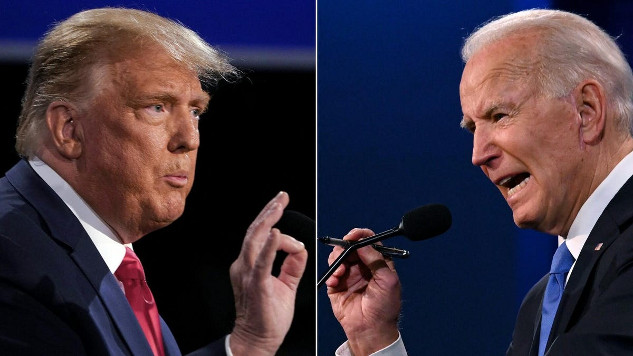
Watching the debate between Joe Biden and Donald Trump, I found the outcome predictable and aligned with expectations. Joe Biden's performance didn't raise significant concerns regarding his competency. While Biden has never been renowned for his impromptu speaking abilities, a trait stemming from his extensive tenure in the Senate, he speaks more like a senator than a president. This habit, combined with his lifelong struggle with stuttering, often makes his delivery appear stiff. It's also worth noting that his physical demeanor, particularly his walking style, could improve. As one age, it's common to drag one's feet and stumble; however, Biden's cautious gait could benefit from practicing a more natural stride to avoid appearing precarious.
A notable aspect of Biden's speaking style during the debate was his tendency to talk rapidly. This approach, reminiscent of Fox News and Rush Limbaugh's talk show styles, has unfortunately become mainstream. Such a method, often a Gish Gallop tactic, aims to overwhelm the opponent rather than engage in meaningful communication with the audience. The Gish Gallop is a debate tactic that involves overwhelming the opponent with a rapid series of half-truths and lies, leaving them unable to respond to each one effectively. In this case, most of his responses were truths or partial-truths at worst. This rapid delivery worked against Biden, detracting from the clarity and impact of his messages.
The Debate Decision: A Questionable Choice
Looking back, it's clear that Biden faced an uphill battle in this debate. Debating someone frequently resorts to lies, exaggerations, and projection is inherently challenging. Trump's disregard for conventional debate rules meant that any attempt to engage him in a structured argument was an uphill battle, to say the least.
Liberals, including Biden, typically adhere to established norms and expect their leaders to do the same. This adherence can be a disadvantage when facing an opponent with no qualms about breaking the rules. In essence, debating a rule-breaker requires a willingness to counter with equally unconventional strategies, which Biden seemed reluctant to employ.
CNN's Role and the Nature of the Questions
CNN's approach during the debate was also a point of contention. The moderators asked leading questions laced with personal bias and, at times, ignorance. For instance, the question about Biden's son's business dealings was seen as a biased attempt to discredit Biden. This format put Biden in a difficult position, as he felt compelled to respond substantively. At the same time, Trump often ignored the questions altogether. Trump's responses were primarily filled with hyperbole, exaggerations, and untruths, contrasting sharply with Biden's attempts to provide detailed answers.
Historically, debates like this one rarely produce positive outcomes. While they might occasionally yield memorable quips that temporarily favor one candidate, they are unreliable indicators of leadership competency. For example, Ronald Reagan's famous quip in the 1984 debate, "I will not make age an issue of this campaign. I am not going to exploit, for political purposes, my opponent's youth and inexperience," effectively diffused concerns about his age with humor and wit. However, such moments are rare and often superficial when determining a candidate's leadership ability.
The moderators' role in this debate was also significant. Their questions, often perceived as biased, shaped the flow of the discussion. Leading questions can corner candidates into defensive postures, which was evident in Biden's responses. Trump's tactic of ignoring inconvenient questions further skewed the debate dynamics, making it challenging for viewers to glean substantive insights from the exchange.
Biden's Communication Style
During the debate, Biden's communication style highlighted his struggle to balance rapid responses and substantive content. His inclination to talk rapidly seemed more an attempt to counter Trump's barrage of statements rather than a strategy to convey his points effectively. This approach may have worked against him, as it can overwhelm listeners and obscure the clarity of his arguments.
Moreover, while not reflecting his intellectual capacity, Biden's stutter added an element of distraction. His efforts to overcome this challenge, commendable as they are, sometimes resulted in stiffness that hindered his overall presentation. It's a reminder that effective communication in a debate setting requires clear articulation and a confident and composed demeanor.
Trump's debate tactics were predictably unconventional. His strategy centered on dominating the conversation through sheer volume and repetition, a classic Gish Gallop technique. By overwhelming Biden with a rapid-fire series of accusations and statements, Trump aimed to disrupt Biden's focus and coherence. In response, Biden attempted to address each point, often resulting in fragmented and hurried replies that needed more depth.
Trump's disregard for factual accuracy further compounded Biden's challenge. Engaging with a candidate who frequently distorts facts requires a different approach; a more strategic focus on key messages might have served him better. Biden struggled to implement this complexity of the situation effectively.
更广泛的影响
The broader implications of this debate are significant. Debates should serve as platforms for voters to understand the candidates' policies, vision, and competence. However, the chaotic nature of this debate highlighted the limitations of the format, especially when one participant needs to respect established norms.
Ultimately, the ability to lead a nation requires more than the ability to perform well in a debate. Competency encompasses a range of skills, including decision-making, diplomacy, and crisis management—qualities that are not always evident in a debate setting. This particular debate, with its focus on rapid exchanges and rule-breaking tactics, did little to illuminate the true capabilities of either candidate.
As voters reflect on the debate, it's crucial to consider the broader context of each candidate's track record, policies, and potential for effective leadership. While debates can offer glimpses into the candidates' personalities and rhetorical skills, they should not be the sole determinant in choosing a leader. The substance of their policies, past performance in public service, and vision for the future are far more critical factors.
In conclusion, the Biden-Trump debate was a microcosm of the current political climate marked by deep divisions and unconventional tactics. Biden's performance, while competent, was hampered by his rapid delivery and the need to counter Trump's barrage of statements. Trump's disregard for debate norms and factual accuracy presented a unique challenge, highlighting the difficulties of engaging with an opponent who plays by different rules. As we move forward, focusing on the broader context of each candidate's capabilities and vision is essential, rather than the chaotic nature of a single debate.
关于作者
 罗伯特·詹宁斯 (Robert Jennings) 与妻子玛丽·T·拉塞尔 (Marie T Russell) 共同出版了 InnerSelf.com。 他曾就读于佛罗里达大学、南方技术学院和中佛罗里达大学,研究房地产、城市发展、金融、建筑工程和基础教育。 他是美国海军陆战队和美国陆军的成员,曾在德国指挥野战炮兵连。 在 25 年创办 InnerSelf.com 之前,他在房地产金融、建筑和开发领域工作了 1996 年。
罗伯特·詹宁斯 (Robert Jennings) 与妻子玛丽·T·拉塞尔 (Marie T Russell) 共同出版了 InnerSelf.com。 他曾就读于佛罗里达大学、南方技术学院和中佛罗里达大学,研究房地产、城市发展、金融、建筑工程和基础教育。 他是美国海军陆战队和美国陆军的成员,曾在德国指挥野战炮兵连。 在 25 年创办 InnerSelf.com 之前,他在房地产金融、建筑和开发领域工作了 1996 年。
InnerSelf 致力于分享信息,让人们在个人生活中做出有根据和有见地的选择,造福大众,造福地球。 InnerSelf 杂志已经出版 30 多年了,无论是印刷版 (1984-1995) 还是在线版 InnerSelf.com。 请支持我们的工作。
知识共享4.0
本文按照知识共享署名 - 相同方式共享4.0许可协议进行许可。 属性作者 Robert Jennings,InnerSelf.com。 链接回文章 这篇文章最初出现在 InnerSelf.com

相关书籍:
论暴政:二十世纪的二十个教训
通过蒂莫西·斯奈德
这本书提供了维护和捍卫民主的历史教训,包括制度的重要性、公民个人的作用以及威权主义的危险。
我们的时代到了:力量,目标与为公平的美国而战
通过斯泰西艾布拉姆斯
作者是一名政治家和活动家,分享了她对更具包容性和公正的民主的愿景,并提供了政治参与和选民动员的实用策略。
民主政体如何消亡
史蒂文·莱维茨基和丹尼尔·齐布拉特
这本书研究了民主崩溃的警告信号和原因,借鉴了来自世界各地的案例研究,以提供有关如何维护民主的见解。
人民,没有:反民粹主义简史
托马斯·弗兰克
作者提供了美国民粹主义运动的历史,并批评了他认为扼杀了民主改革和进步的“反民粹主义”意识形态。
一本书或更少的民主:它是如何运作的,为什么它不起作用,以及为什么修复它比你想象的要容易
通过大卫利特
这本书概述了民主,包括它的长处和短处,并提出了改革建议,使该制度更具响应性和问责制。



























